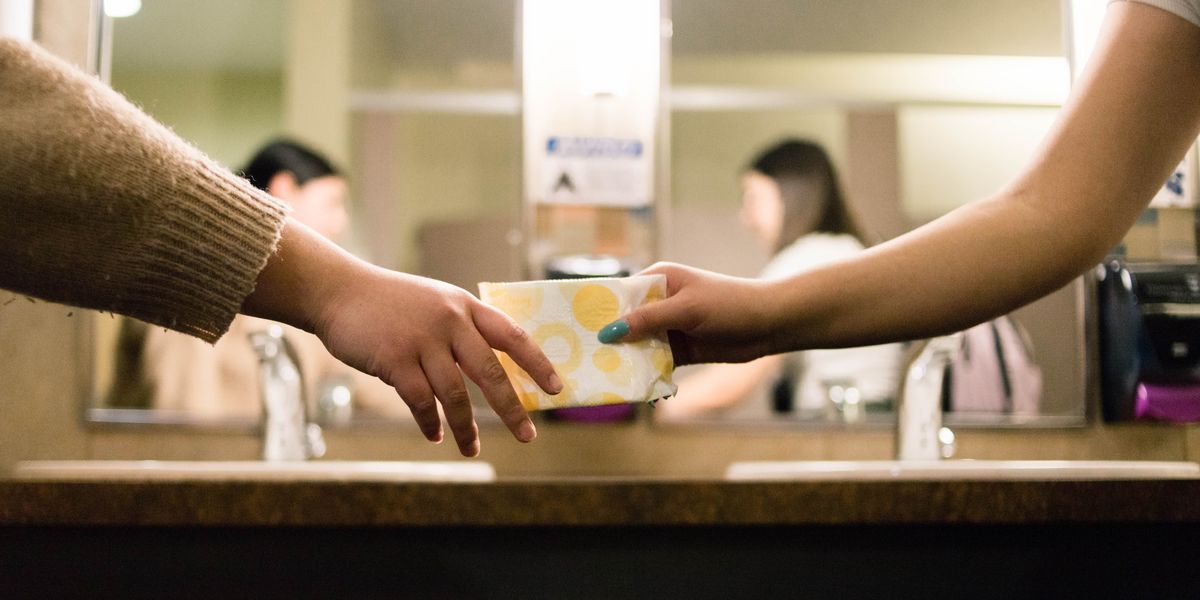
Many everyday household products expose us to chemicals and pollutants. Few products, however, allow these chemicals to interact with our bodies as intimately as pads, tampons, menstrual cups and other period care products.
The risks of exposure to potentially harmful chemicals in menstrual products is not equal for everybody. In a new paper, researchers drew from the data of two existing studies to see which individuals were more likely to use scented versus unscented menstrual products. Scented products are more likely to contain harmful volatile organic compounds, or VOCs, which are linked to many different health risks including cancer, skin irritation and organ damage that can leach into the skin compared to unscented products.
VOCs are “a very broad chemical class,” but many are well-known carcinogens, said Sung Kyun Park, an associate professor of epidemiology and environmental health sciences at the University of Michigan. Phthalates, for example, are fixatives used to bind fragrance to a product, but they are also endocrine-disrupting chemicals, meaning they alter the normal functioning of hormones. These chemicals are released into the body, and the genital skin is much more permeable than the skin in other body parts, he told EHN. Over decades of periods and using these products, that’s a significant amount of exposure. In the new paper, Zota noted other concerning chemicals found in some menstrual and intimate care products including asbestos, dioxides and per- and polyfluoroalkyl substances, or PFAS—all of which are linked to detrimental health effects.
They found that older individuals and those with lower levels of education were more likely to use the riskier, scented menstrual products. Black participants were also more likely than their white counterparts to use scent-altering intimate care products like vaginal douches and wipes. The new research is published in Frontiers in Reproductive Health.
“There are products marketed for odor control, perceived ‘freshness’ and vaginal or vulvar cleanliness” with chemicals carrying potentially serious health risks, lead author Ami Zota, an associate professor of environmental health sciences at Columbia University Mailman School of Public Health and both founder and director of Agents of Change*, told Environmental Health News (EHN).
Racial stigmas

This study is one step toward elucidating what social drivers might contribute to these trends.
For example, using scented products was strongly linked to older age. While this research doesn’t get at why, it could be more awareness in younger generations of harmful chemicals in menstrual products, said Zota, or that younger generations are less accepting of different stigmas surrounding menstruation like odor.
Family culture plays a big role. “When it comes to menstrual hygiene, you’re very influenced by the people around you that you trust when you’re an adolescent,” said Zota. So if your mom, aunts or older siblings use scented products, you’re probably more likely to as well. These practices are more prevalent in Black families, she added — these products tend to be more heavily marketed in Black communities with messages of “cleanliness” and “freshness” that play into racialized stigmas about body odors and uncleanliness.
“It is very true that there is a distinct bias that comes from racism that says that Black women are not fresh, are not clean,” Tianna Shaw-Wakeman, the environmental justice program manager for Black Women for Wellness, a non-profit based in south Los Angeles geared toward supporting the health of Black women and girls, told EHN. Black Women for Wellness was a lead collaborator for one of the studies that this new paper was based on. One example is how heavily marketed Johnson & Johnson talc baby powder was to Black communities, and how popular it was because of its scent. That product contained asbestos and was linked to cancer cases. And after myriad lawsuits, it is no longer sold on U.S. markets.
Education linked to less exposure
Using unscented products was more associated with higher levels of educational attainment. In theory, this may be because “when you go to live away from home, which you often do when you go to a four year college, you’re exposed to new ideas and you’re open to behavior change,” said Zota.
People learn to use these products through family, and so you can also unlearn these things with the help of family, Shaw-Wakeman said. To steer people away from scented menstrual products, groups like Black Women for Wellness can take grassroots initiatives and foster education through communities.
Zota added that clinicians like gynecologists are often trusted sources of health information and getting more of them to inform patients about the risks of scented products can effectively get the word out.
Regulating toxic period care products
Health agencies should be aware that these products warrant more regulation, said Zota. For items regulated as “cosmetics” by the Food and Drug Administration, including douching solutions, sprays, wipes and powders, the FDA does not require companies to disclose the ingredients in flavors or fragrances, since these are often proprietary “trade secrets.” But the health risks, especially long-term, of the VOCs often present in scented products are not well studied, said Park.
In an email, an FDA representative wrote that the agency is reviewing and potentially updating their guidance document on menstrual pads and tampons and that they are “committed to assuring manufacturers of menstrual products take appropriate steps to ensure their devices are compliant with all relevant FDA guidelines and are safe and effective.”
There is certainly more research to be done. Phyllis Mugadza, a PhD candidate in environmental health epidemiology at Harvard University and the founder and CEO of Sprxng LLC, a company developing the next generation of reusable menstrual products, told EHN that she’d like to see more on the link between race and education, and how the interaction of those two things affect product choices. She also noted how variables like lack of access to private bathrooms can affect things like period odor stigma or wider menstrual stigma generally.
Menstruation can still be a tough and sensitive thing to talk about for many people — it’s personal and intimate. But “beauty is a form of power,” said Zota, “one that comes with social and economic benefits.” And scents and smells are a part of that, which is what makes this important to both research and discuss.
*Editor’s note: The Agents of Change in Environmental Justice program is a partnership between Columbia University’s Mailman School of Public Health and Environmental Health News.
